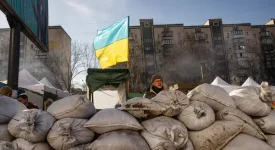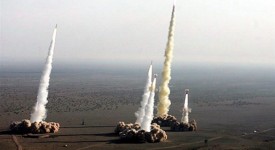Exclusive Interview with Munib Rashid al-Masri (Palestinian businessman, politician and philanthropist)
Munib Rashid al-Masri, in the West Bank also known as the “Duke of Nablus”, the “Palestinian Rothschild” or the “Godfather”, is not only the richest Palestinian in the Palestinian Territories, but he is also one of the most influential. He has a fortune estimated at $1.6 billion, and is chairman of the powerful Palestine Development and Investment Company (Padico), a firm whose interests represent an estimated one-quarter of the whole Palestinian economy. The 80-years old businessman, politician and philanthropist is a member of the Palestine Legislative Council and former Jordanian Cabinet Minister. During his term as cabinet minister he helped Yasser Arafat and his Fatah commanders escape Jordan during the Black September period.
Masri, on no fewer than three occasions, turned down the premiership of Palestine. In 1994, after the signing of the Oslo Accords and the establishment of the Palestinian Authority, Yasser Arafat asked al-Masri to become prime minister, but he refused. On his memories and close relationship with Arafat, Masri says: “He gave us hope. He gave us determination, and to think and to dream that this dream will come true, to go back to our homes… He was an extraordinary leader, we loved him and he was our hero. And to me he was also a friend. Although, he made many mistakes, but a hero can be forgiven.” Over the last few years, Munib Rashid al-Masri has been obsessed by two goals: reconciling the Palestinians, and making peace with Israel.
EUBULLETIN: You say that the economics, in particular building an economic relationship between Israel and the Palestine Territories, cannot solve the conflict. Why do you think that first of all a political solution must be found and then the economics will follow?
M.R. al-Masri: The problem is a political one. The United Nations-sponsored 1947 Partition Plan created Israel and gave it 54 percent while it gave 46 percent to the Palestine. The Arabs rejected the plan at the time. Then, in the Oslo Accords of 1993, the Palestinians made all the hard decisions, including accepting 22 percent of the land instead of 100 percent but Mr. Netanyahu is saying, that’s too much for you, take 10 percent. That’s not right.
And then the Arab Peace Initiative came in 2002, which offered an excellent platform, an excellent offer to the Israelis – it said that 57 Arab countries would normalize commercial relations and would recognize the State of Israel. I would expect that it should be very difficult for Israel to refuse this proposal but now it’s on the table and I wish the Israelis will wake up because if they did not wake up, a big volcano and tsunami and the Arab Spring are coming! The thing is that you cannot be under the occupation all your life – the 45-year-long Israeli occupation is the worst occupation that the world has seen in the last few decades. Spring is coming.
EUBULLETIN: But do you think – in light of the current geopolitical setting in the Middle East – that there is still a ‘place’ for Israel to co-exist peacefully with its neighbors?
M.R. al-Masri: Mr. Rabin and Mr. Arafat believed that negotiations could lead towards a peaceful solution – then an Israeli extremist killed Mr. Rabin and lots of people from the Palestinian side believe that Mr. Arafat was also killed by a fanatic. This is not my opinion – at the moment, we have an investigation going on, so hopefully soon we will know who killed Mr. Arafat. But, at this stage, we should move on. I hope the Israelis will wake up and accept the Arab Peace Initiative that provides solution for all the main problems. The issue of borders is immensely important for the Israelis but if they try hard to work out a compromise solution, then they will be accepted and loved in the region.
If the Israelis come and accept themselves as part of the region, it will be good for the whole region and I think Israel will be loved. Their technology, their ability, their medicine – they can offer a lot of things but they need to say that they are part of the region. We are not Americans, we are not Europeans. We have some problems but these can be solved – we have to be realistic in our aspirations but there is enough room for all of us. In fact, in Oslo, the Palestinians only took 22 percent, instead of 100 percent, of the land – this is the sacrifice we have made. Now, it’s time for Israelis to say: ‘Yes, we accept the Palestinian state, we want to share our land together, we want to be together.’
EUBULLETIN: When we look at the vote in the UN a couple of months ago, the majority of European member states, except for the Czech Republic, supported Palestine. Do you see the UN vote as the first step for Palestine to become a full-fledged state?
M.R. al-Masri: Yes, I do. And I wished Israel to be part of this recognition. Much like the Palestinian Liberation Organization (PLO) back then recognized the State of Israel, now I want Israel to recognize Palestine as an independent state before the European states, including the Czech Republic, will that. I want to see Israel to say: ‘Yes, we have enough confidence for the Palestinians to become a good neighbor, a state that could live side by side with us.’ And I hope that, in the future, Czech Republic, much like other European states, will realize that they can have good relations with both sides – Israel and Palestine. I even hope the peace treaty recognizing the state of Palestine could be signed in Prague because it is a capital city of a small nation, whose former President, Vaclav Havel, is a globally respected hero who devoted his life to the fight for freedom.
EUBULLETIN: Many people nowadays say that after what has happened especially in Egypt and Syria, there is no longer ‘Arab Spring’ with all its hopes and aspirations but rather ‘Arab Winter’ that has seen authoritarian regimes returning to the helms of power. If you look at the broader picture in the MENA region, do you agree with this argument?
M.R. al-Masri: No, it’s still the ‘spring’, not ‘winter’. The older rulers, some generals who became presidents for life, became dictators, and to pay their dues to be in power, they were stooges of the West, to keep their oil flowing. And these dictators were kicked out of power by the popular uprisings when their people started asking for democracy and freedom. But it took the French revolution more than 150 years to achieve its objectives and we are now expecting Arab Spring to be completed in 2-3 years? It takes some time… And the biggest cause for this Arab Spring is the Israeli-Palestinian conflict that has not been solved. The Israelis say it has nothing to do with this but I see it as a big cause for the Arab Spring. It is not ‘winter’, it is still ‘spring’ but it is going to take some time. And I hope to see the fruits of the ‘Arab Spring’ still during my life time.
EUBULLETIN: What would be the two or three policies that you would implement instantly to make the Middle East and North Africa region overall more stable and prosperous?
M.R. al-Masri: First of all, the priority would be solving the Arab-Israeli conflict. Secondly, to design and implement an economic master plan like the Marshal Plan for Europe after the end of the WWII – but this time it would aim at the whole MENA region to create an economic revival. The whole world will benefit from this ‘Marshal Plan’ – worth perhaps 300-400 billion of dollars – because you have rich people in the Arab world who can pay and also the major corporations would participate in rebuilding the MENA region. But first we need to solve the main political problem – the Arab-Israeli conflict. If we solve the Arab-Israeli conflict, the whole region, including the Israelis, will benefit from the political-security stabilization.
EUBULLETIN: You are also very active as a philanthropist – you run one of the biggest charity organizations in the region that supports schools, hospitals, think-tanks. To what degree can these activities contribute to the peace in the MENA region? For example, can your financial support for education make the region more peaceful?
M.R. al-Masri: For the whole region to be prosperous, you must make sure you have enough elementary schools, secondary schools, universities, hospitals – it is part of the process of creating, of building the state organizations, to build the infrastructure. We must remove all the barriers, all the boundaries, open up the whole region – be like the United States or Europe. The whole area could flourish out of this. Once you have solved the main obstacle, the political problem – the Arab-Israeli conflict – you can then draw up the road-map for economic development for the whole region.







